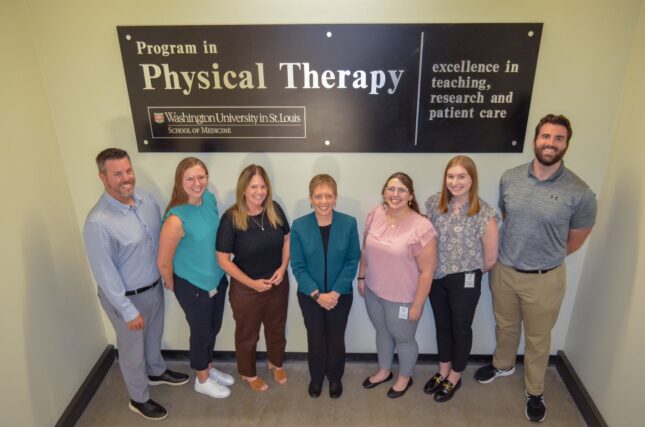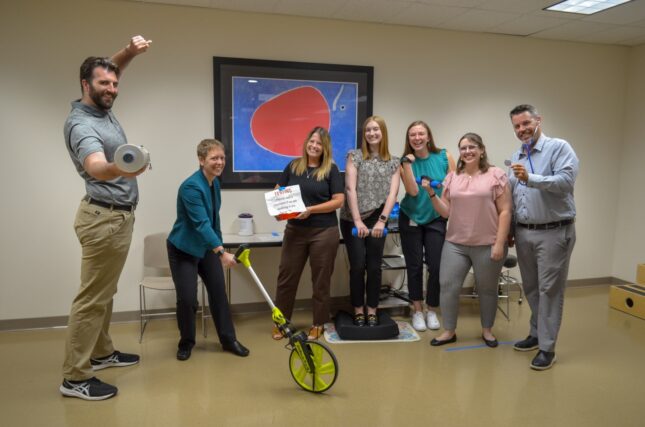The goal of our work is to investigate how the human nervous system controls movement in health and in neurological and neurodegenerative disease.

We employ kinematic, kinetic, electromyographic, and neuroimaging techniques to study the neural control of movement. In particular, we are interested in locomotor and postural control in movement disorders such as Parkinson disease (PD). We aim to better understand factors in Parkinson disease that may contribute to difficulties with movement and to develop new and better treatment approaches to address these issues.
Since PD is a progressive, neurodegenerative condition, it is important for us to examine how movement and quality of life change over time in this population. In addition, we are working to gain insight into the impacts and mechanisms of common interventions including physical activity, pharmacotherapy, and deep brain stimulation on locomotor deficits. These studies will improve our understanding of motor function in PD over the course of the disease, helping to inform clinical recommendations and interventions for people with PD.
Faculty Investigators
Gammon M. Earhart, PT, PhD, FAPTA [Profile ![]() ]
]
Ryan P. Duncan, PT, DPT, MSCI [Profile ![]() ]
]
Kerri Rawson, PhD, MS – Assistant Professor [Profile ![]() ]
]
Staff
Kevin Holley, MS – Clinical Research Study Assistant
Lauren Tueth, PT, DPT, PhD – Staff Scientist
Trainees
Sidney Baudendistel, PhD – Postdoctoral Fellow
Allison Haussler, BS – PhD Student
Tina Chang, SPT-DPT Student
Liza Birov – Undergraduate Student
Rhea Wagh- Undergraduate Student

Current Research Studies
Walking and mHealth to Increase Participation in Parkinson Disease (WHIP-PD)
Funding Source: NIH R01HD092444
Identifying effective ways to improve function, slow decline and reduce disability is a high priority for people living with Parkinson disease and other chronic conditions. Regular participation in walking is essential to reduce disability and enhance participation in preferred life activities. However, people with chronic conditions are often sedentary, contributing to greater disability. The goal of this work is to determine the benefits of a walking program and cognitive-behavioral strategies delivered using mobile health technology for people with Parkinson disease over a sustained period of time.
Freezing of Gait in PD
Funding Source: NIH R34 AT011015
Freezing of gait, a sudden, unintentional stopping of ongoing walking, is a serious problem for many individuals with PD. Our studies use a variety of approaches including wearable sensors to detect freezing, kinematics to measure gait in people with and without freezing and functional magnetic resonance imaging to determine how brain activity and connectivity differ in individuals with PD with and without freezing of gait, and testing of novel interventions like mindfulness to reduce freezing.
Novel Cueing Strategies to Improve Gait in PD
Funding Source: NIH R61 AT010753, NIH R61 AT010753S1, , NIH R33 AT010753
Gait dysfunction in Parkinson disease (PD) is disabling and leads to reduced quality of life. Enhancement of walking through use of rhythmic auditory cues may be helpful, but we do not yet understand how people respond to different types of cues (external vs. self-generated), what factors predict responsiveness to cues, and what neural mechanisms underlie these responses. This work will provide a solid foundation of knowledge in these areas and could ultimately lead to the development of personalized cueing interventions to optimize gait for individuals with PD, thereby reducing disability and improving quality of life.

SPARX3: Study in Parkinson’s Disease of Exercise
Funding Source: NIH U01NS113851
The SPARX3 (NCT04284436) study is the first randomized control trial designed to investigate the effects of moderate- and high-intensity aerobic exercise on disease progression in untreated patients with Parkinson’s.
Parkinson Disease Clinical Subtypes: Validation, Clinical Utility and Biological Correlates
Funding Source: NIH R01NS097437
There is variability in clinical presentation and progression of PD. We aim to identify and validate PD clinical subtypes based on comprehensive motor, cognitive, and psychiatric evaluations. As part of a multidisciplinary team, our lab is specifically involved in assessing gait patterns and their potential as biomarkers for PD subtypes.
Investigations of Dementia in Parkinson Disease
Funding Source: NIH R01NS075321
Parkinson disease (PD) produces progressive motor and cognitive impairments leading to dementia in ~75% of patients after 10 years. This multimodal study will establish the time course of changes in a variety of biomarkers that is critical to design studies to slow PD progression and identify targets of engagement for new therapies. As part of a multidisciplinary team, our lab is specifically involved in assessing gait patterns and how they change with changes in cognitive function in people with PD.
Low Back Pain in Parkinson Disease
Funding Source: NIH K23HD100569
Low back pain (LBP) is the most prevalent secondary condition in Parkinson disease (PD), affecting up to 74% of patients. In the general population, LBP causes significant morbidity, but the effect of LBP in patients with PD is not well understood and treatment options are lacking. The overall goal of this cross-sectional investigation is to comprehensively characterize LBP in PD. We will determine whether and how factors known to contribute to LBP differ between people with PD and older adults. Information gained from this study will lay the foundation for development of therapeutic interventions for LBP in PD, which may reduce disability and improve quality of life.
Gait and Balance in Huntington Disease
Funding Source: Program in Physical Therapy
While our lab focuses mainly on Parkinson disease, we recognize that other less common movement disorders are often understudied. Such is that case in Huntington disease, where they are many fewer studies of walking, balance and physical activity as compared to the number of studies in Parkinson disease. Through this line of research, we are working to fill this knowledge gap and better understand walking, balance and physical activity levels in people with Huntington disease.

Past Research Studies
- Graceful Gait: Dance to Improve Walking (National Endowment for the Arts)
- Exercise and Parkinson’s: Comparing Interventions and Exploring Neural Mechanisms (NIH 1R01NS077959)
- Oculomotor Control and Gait in Parkinson Disease (NIH 1R01HD056015)
- Unveiling the Natural History of Mobility and Quality of Life in PD: Charting History of Progression (Davis Phinney Foundation and the Parkinson Disease Foundation)
- Rotating Treadmill Training: Adaptation and Application (NIH 5K01HD048437)
- Physical Therapy and Deep Brain Stimulation in Parkinson Disease (NIH K12055931)
Beyond the Lab
